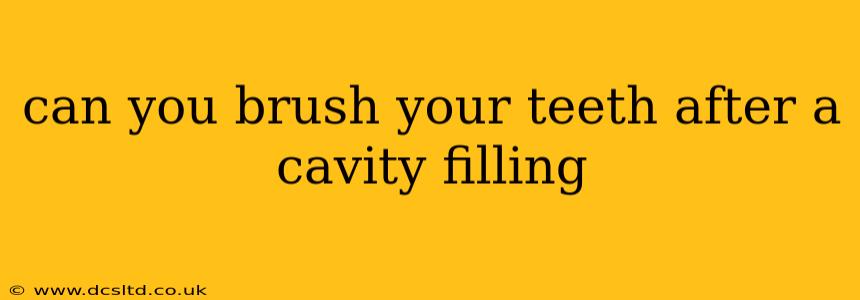Can You Brush Your Teeth After a Cavity Filling?
Yes, you absolutely can brush your teeth after a cavity filling, but it's crucial to do so with care and follow your dentist's specific instructions. The immediate aftermath of a filling requires a gentle approach to avoid disrupting the healing process or damaging the newly placed material. Let's explore the best practices for brushing after this common dental procedure.
How Soon After a Filling Can I Brush My Teeth?
Generally, you can brush your teeth a few hours after getting a filling. However, your dentist might recommend waiting longer, especially if you've had a particularly sensitive filling or a complex procedure. The key is to allow the anesthetic to wear off completely and the filling material to begin to set properly. Rushing the process could lead to irritation or even dislodging the filling. Always heed your dentist’s advice; they know the specifics of your procedure and your individual needs.
What Kind of Toothbrush Should I Use After a Filling?
For the first few days following your filling, it's best to use a soft-bristled toothbrush. A hard-bristled brush could be too abrasive and potentially irritate the area around the filling. Gentle brushing is key to both cleaning your teeth effectively and avoiding any undue pressure on the new filling. Consider using a toothbrush with a small head for better access to all areas of your mouth.
Should I Use Special Toothpaste After a Filling?
Your dentist might recommend a desensitizing toothpaste if you experience any sensitivity around the filling. These toothpastes contain ingredients designed to soothe sensitive teeth and help reduce discomfort. However, for most people, regular fluoride toothpaste is perfectly fine after a cavity filling. Avoid harsh, whitening toothpastes in the immediate aftermath as they can sometimes be too abrasive.
What If My Teeth Still Feel Sensitive After a Filling?
Some degree of sensitivity is common in the days following a filling. However, persistent or severe sensitivity warrants a call to your dentist. They can assess the situation and advise on the best course of action. This could involve adjusting the filling, recommending a different toothpaste, or exploring other options to alleviate the sensitivity.
Can I Use Mouthwash After Getting a Filling?
Using mouthwash is generally fine after getting a filling, but again, wait a few hours to allow the anesthetic to wear off completely and the filling to set. Choose an alcohol-free mouthwash to avoid irritating the area further. Avoid strong, abrasive mouthwashes immediately post-filling.
How Long Does it Take for a Filling to Fully Set?
The time it takes for a filling to fully set depends on the type of filling material used. Composite resin fillings, for example, typically require a few hours to set, while amalgam (silver) fillings might take longer. Your dentist will be able to provide a more accurate timeframe based on the specific materials used in your procedure.
Following your dentist's instructions diligently after a cavity filling is vital for its long-term success. By brushing gently with a soft-bristled toothbrush and using the recommended toothpaste and mouthwash, you can help ensure the health and longevity of your newly restored tooth. Remember, if you have any concerns or questions, it's always best to contact your dentist directly for personalized advice.
